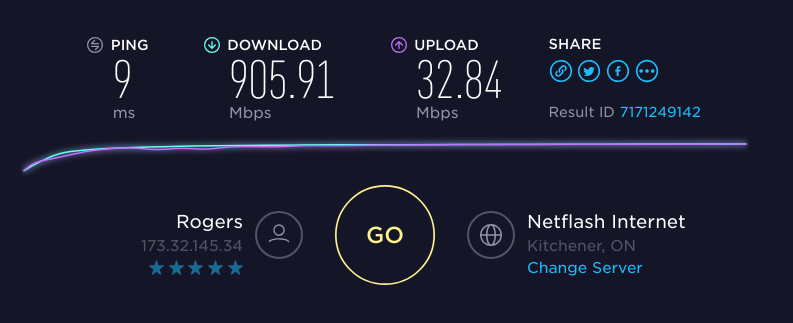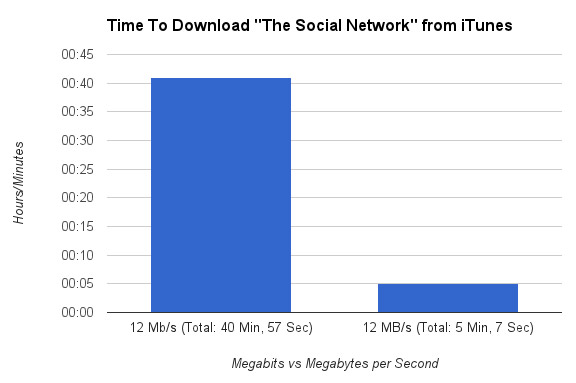The Future of Internet Speeds: Patterns in Megabits Per Second
The Future of Internet Speeds: Patterns in Megabits Per Second
Blog Article
Just How Megabits Per Second Influence Your Online Activities
The principle of megabits per second (Mbps) plays an essential role fit our on the internet experiences. As electronic tasks proliferate, understanding the effects of Mbps on streaming, video gaming, and video clip conferencing comes to be increasingly crucial. Higher Mbps can improve efficiency and decrease interruptions, while poor rates may cultivate stress and inadequacy. Analyzing your home's details requirements in connection with these rates is crucial, especially as several tools contend for bandwidth. Yet, the subtleties of how Mbps influences numerous online tasks require additional expedition, particularly as our dependence on electronic connectivity continues to develop.
Understanding Megabits Per Second
When taking into consideration web rate, it's vital to understand the concept of megabits per second (Mbps), which acts as a standard measurement for information transfer prices. This metric measures just how much information can be sent over a web link in one second, providing a clear understanding of performance capabilities - Megabits Per Second. For context, one megabit is equivalent to one million little bits, and Mbps is generally utilized to express bandwidth for different on the internet tasks
A greater Mbps shows a quicker internet link, making it possible for users to do jobs such as downloading and install data, searching websites, and participating in on the internet video gaming much more efficiently. Common surfing needs around 1-5 Mbps, while streaming high-definition video clip might demand 5-25 Mbps. Recognizing these needs is vital for identifying the ideal web rate required for details tasks.
In addition, the variety of gadgets connected to a network can impact total performance. Numerous customers streaming, video gaming, or downloading and install simultaneously can strain readily available data transfer, resulting in slower rates - Megabits Per Second. Evaluating individual online habits and needs is vital in picking a web plan that lines up with one's requirements, making certain a seamless digital experience
Streaming and Buffering Issues
Streaming high-def web content has actually come to be a staple of contemporary on the internet entertainment, yet it is frequently accompanied by annoying buffering issues. These interruptions can substantially diminish the watching experience, causing frustration and potential loss of audience interaction. Buffering happens when the information sent from the streaming solution is not obtained promptly enough to maintain a smooth playback, usually due to insufficient net speed determined in megabits per second (Mbps)

Moreover, real-time streaming can be affected by network congestion, which takes place when multiple devices share the exact same transmission capacity. Maximizing link rate and making sure ample Mbps is important for a smooth streaming experience. As streaming services proceed to evolve, comprehending the effect of Mbps on buffering concerns continues to be important for customers seeking undisturbed entertainment.
Online Pc Gaming Efficiency
The influence of internet speed on online activities expands beyond streaming, significantly affecting on the internet gaming performance. In competitive pc gaming, low latency and high data transfer are essential for a smooth experience. A fast link lessens lag, enabling gamers to react quickly to in-game events, which can be the distinction between triumph and loss.
Transmission capacity, gauged in megabits per second (Mbps), plays an essential duty in sustaining multiple tools and pc gaming platforms at the same time. Inadequate bandwidth can lead to went down links or decreased game high quality, adversely affecting gameplay. On-line multiplayer games require substantial data transfer, particularly throughout peak pc gaming hours when various players are online.
In addition, the kind of game can additionally determine the essential net speed. Busy first-person shooters demand greater rates to keep responsiveness, while turn-based strategy video games might work fairly well on lower rates. As online video gaming remains to advance, with increasing graphical integrity and even more complicated multiplayer settings, the need for higher Mbps will just increase. Players need to guarantee they have ample web speed to boost their pc gaming efficiency and overall experience. Buying a robust net connection is important for gamers aiming to optimize their performance and satisfaction.
Video Clip Conferencing High Quality
In today's electronic landscape, video conferencing quality is greatly influenced by internet rate, particularly in terms of transmission capacity and latency. Top notch video calls call for adequate transmission capacity to transfer audio and video data flawlessly. Normally, a minimum of 1.5 Mbps upload and download rates is recommended for standard meaning video clip, while high-def video conferencing usually requires at the very least 3 Mbps.
Latency, or the hold-up in between sending out and obtaining data, also plays an essential function in the user experience. Higher latency can lead to resemble, lag, and disjointed interactions, which can hinder cooperation and interaction throughout conferences.
In addition, numerous individuals in a video meeting can strain available transmission capacity, demanding even higher rates. Network congestion, usually caused by synchronised activities like streaming or downloading, can even more weaken video clip quality. Thus, for companies counting on video clip conferencing for remote cooperation, recognizing the connection between megabits per second and overall communication high quality is essential for keeping productivity and enhancing virtual communications.
Choosing the Right Net Plan
Picking a suitable internet strategy is vital for making certain optimal performance in numerous online activities, specifically in setups that require high transmission capacity, such as video clip conferencing and online gaming. Megabits Per Second. When taking into consideration a web strategy, it is vital to examine both the rate and information allowance to match your certain use requirements
For families with several users involving in simultaneous tasks, a strategy supplying higher megabits per second (Mbps) is advised. Typically, a minimum of 25 Mbps appropriates for basic streaming and surfing, while plans surpassing 100 Mbps are preferable for even more right here intensive jobs. In addition, think about check my site the nature of your online activities; video clip conferencing requires at the very least 1.5 Mbps upload speed, while on the internet pc gaming may require a lower latency but consistent connection.
It is additionally essential to analyze your data cap. Limitless information strategies can avoid strangling and disruptions, specifically if heavy use is prepared for. Research study service carriers in your location, as schedule and rates can differ. By attentively selecting an internet plan tailored to your needs, you can boost your on-line experience, ensuring smooth, continuous access to your recommended activities.
Conclusion
In conclusion, the importance of megabits per second (Mbps) in shaping on-line activities can not be overemphasized. A complete understanding of private or home Mbps requirements is important for selecting an appropriate net strategy that effectively sustains varied online tasks and individual demands.

Generally, a minimum of 25 Mbps is appropriate for standard streaming and browsing, while plans surpassing 100 Mbps are more effective for even more extensive tasks. In addition, consider the nature of your online tasks; video conferencing needs at the very least 1.5 Mbps post speed, while on-line gaming may need a lower latency however consistent connection.
Report this page